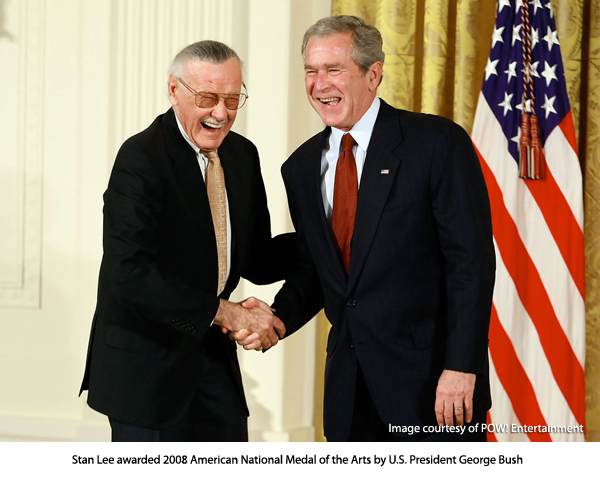Spider-Man Creator Stan Lee
The Marvel of Comic Books and his POW!erful Partner Gill Champion
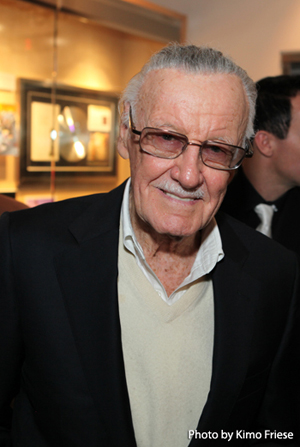 Stan Lee is the man behind some of the world’s best-loved superheroes, including Spider-Man, The Incredible Hulk, Iron Man, Thor, the Avengers, X-Men, The Fantastic Four and over 300 more. An American comic book writer, editor, publisher, media producer, actor, and voice actor, Stan Lee is currently Chairman Emeritus and Editorial Board Member of Marvel Comics, as well as Chairman and Chief Creative Officer of POW! Entertainment. Aged 91, Stan Lee is as sharp as ever and his lifetime accomplishments are as remarkable as the heroes he created. He successfully forced the Comics Code Authority to reform its censorship policies. He led the expansion of Marvel Comics from a small division of a publishing company to a multimedia powerhouse. The Spider-Man strip appeared in more than 500 newspapers worldwide, making it the world’s most successful syndicated adventure strip. He has been inducted into the comic industry’s most hallowed halls of fame and received numerous awards including the 2008 American National Medal of the Arts presented by President George Bush for his work as one of America’s most prolific storytellers and for recreating the American comic book. Tokyo Journal Executive Editor Anthony Al-Jamie met with Stan Lee and business partner Gill Champion at their headquarters in Beverly Hills, California.
Stan Lee is the man behind some of the world’s best-loved superheroes, including Spider-Man, The Incredible Hulk, Iron Man, Thor, the Avengers, X-Men, The Fantastic Four and over 300 more. An American comic book writer, editor, publisher, media producer, actor, and voice actor, Stan Lee is currently Chairman Emeritus and Editorial Board Member of Marvel Comics, as well as Chairman and Chief Creative Officer of POW! Entertainment. Aged 91, Stan Lee is as sharp as ever and his lifetime accomplishments are as remarkable as the heroes he created. He successfully forced the Comics Code Authority to reform its censorship policies. He led the expansion of Marvel Comics from a small division of a publishing company to a multimedia powerhouse. The Spider-Man strip appeared in more than 500 newspapers worldwide, making it the world’s most successful syndicated adventure strip. He has been inducted into the comic industry’s most hallowed halls of fame and received numerous awards including the 2008 American National Medal of the Arts presented by President George Bush for his work as one of America’s most prolific storytellers and for recreating the American comic book. Tokyo Journal Executive Editor Anthony Al-Jamie met with Stan Lee and business partner Gill Champion at their headquarters in Beverly Hills, California.
TJ: Can you tell me a bit about your upbringing?
LEE: I was raised in New York until high school, I moved to the Bronx, and then I had a lot of little jobs. I was a theater usher. I delivered sandwiches. I did publicity writing for a company, then I got a job at Marvel which was then called “Timely Comics”, and then I joined the army. When I came back, I went back to work for Marvel, and stayed there ever since.
TJ: How long were you in the army?
LEE: Three years.
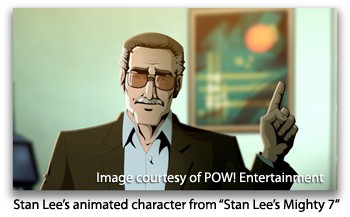 TJ: What did you do?
TJ: What did you do?
LEE: Believe it or not, I wrote instructional films and manuals. They were having problems training troops fast enough on many technical things, and someone noticed that I had been working as a writer, so I had to rewrite the technical manuals in a more simple way, without all the technical gibberish.
TJ: And where was the training film division?
LEE: Astoria, Queens in New York.
TJ: I understand your brother worked with you for a number of years.
LEE: Well he did a number of strips: a western called “The Rawhide Kid”, the first issue of Iron Man, I believe, and one other – perhaps, Thor. I didn’t have time to write everything, so I’d come up with an idea and say, “Will you write it?” “Will you write it?”
“Will you write it?” and he was a good writer and a good artist.
TJ: And what is his name?
LEE: Larry Lieber.
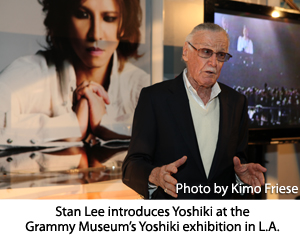 TJ: Larry Lieber... So how did you get the name Stan Lee?
TJ: Larry Lieber... So how did you get the name Stan Lee?
LEE: When I started working it was almost embarrassing to tell people, “I write comics.” Most parents didn’t even want their children to read comics. In some cases, they were right! Comics weren’t well written, and just had a lot of action and fighting. So I didn’t want to use my name because I thought one day I would write something good as “Stanley Lieber”. So I cut my name in half and called myself “Stan Lee”. Years went by and more people knew me as Stan Lee than Stanley Lieber, so to make my life simple, I just legally changed it to Stan Lee.
TJ: Is there anybody that had a major influence on you and your career?
LEE: Everyone I read about – Sherlock Holmes, Robin Hood... Speaking of Robin Hood, one actor Errol Flynn – I was very impressed by him. He seemed like the perfect hero, and I always felt, “When I grow up I’d like to be like Errol Flynn!”
TJ: Do you have a favorite comic artist?
LEE: Oh, so many. I worked with Jack Kirby most. He was just great. He could draw anything and make it look so exciting. But we worked with so many great artists. Steve Ditko, and Gene Colan and John Buscema and John Romita; it goes on and on.
TJ: Is there one piece of work that stands out to you as your best?
LEE: No. I’m my biggest fan! I love everything I’ve written. Every time I read one of the old stories, I can’t believe I was that good! Did I do that? Wow! That’s great! (laughs)
TJ: Did Japanese comics or animation have an influence on you?
LEE: Yes! Because they are such a different style of storytelling, I don’t know whether they influenced me that much, but I was always fascinated by them.
TJ: Have you ever worked with Japanese animators?
LEE: Yes, a few – very talented artists. Some Japanese animation is just beautiful.
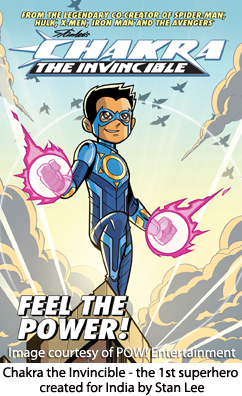 TJ: What about Osamu Tezuka?
TJ: What about Osamu Tezuka?
LEE: Oh, he was wonderful! There are so many talented people in Japan. The last time I went was with a delegation of Japanese animators and we also went to China and met Chinese animators, and I had to make a speech. Someone translated what I said into Chinese and someone else into Japanese, so it took me forever to finish that little speech! But both sides were wonderful.
TJ: Do you do any business in Asia?
LEE: Yes, we have a manga book in Japan called “Ultimo”. I came up with the hero, and the comic book comes out all the time. I believe the “Heroman” animated TV series is still running. I very much enjoyed working with them – we had a little computer here and they had theirs, and we would see each other on the computer and try and make out what we were saying. It was fun! Right now we’re working on a motion picture called “The Annihilator” with a Chinese company and a cartoon series called “Chakra: The Invincible” with an Indian company.
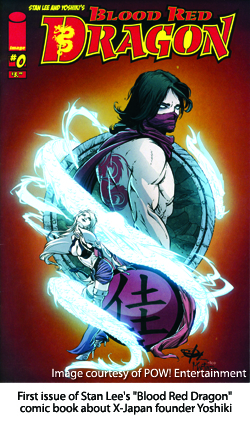 TJ: I understand you did “Blood Red Dragon” based on the Japanese rock and classical musician Yoshiki.
TJ: I understand you did “Blood Red Dragon” based on the Japanese rock and classical musician Yoshiki.
LEE: Yes! We made a superhero out of Yoshiki, and it was quite a good book.
TJ: And this is all being done through POW!?
LEE: Oh, we have this company called “POW! Entertainment” and I’m sure you’ve figured out already that POW! stands for “Purveyors of Wonder”. We do television shows, movies, digital comics, and there’s a live theatrical production in Macau that we’re doing. Whatever’s to be done in entertainment, we like to be part of it.
TJ: So throughout your career, your superheroes don’t often have sidekicks. Why’s that?
LEE: Well, I never understood the sidekick business, like “Batman and Robin”. I always used to say, if I were a superhero why would I want to go around with some teenager? At the very worst, people might talk! Sometimes the story might call for you to have a partner, but in most that I’ve written the hero could stand on his own. It made it easier for me - one less name to remember!”
TJ: When you are creating a superhero, how does the process work?
LEE: Well, obviously the first thing is to think what superpower he or she has. Then, you say to yourself, “How can I make people care about this and be interested?” Then most important to me is the hero’s personal life and how this affects the hero’s superhero existence. Because to me if you are not interested in the character’s personal life, then all you are getting is someone running around beating up bad guys.
TJ: Do you have a favorite superhero?
LEE: Oh, I’m like a parent with children. I love them all equally.
TJ: And what made you decide to give your superheroes human flaws or moral flaws?
LEE: Well, I always tried to write the stories that I myself would like to read, and I want to know what kind of person is he. Nobody is free of worry. “What does he worry about? What are his problems?”
TJ: I understood you took a lot of flack for using complex dialogue when the powers that be felt that comics should be simple. Wasn’t it with the Fantastic Four that this started?
LEE: Well my publisher just wanted action with no personal life or anything. I was tired of it and I wanted to quit. My wife said, “Before you quit, why don’t you do one story the way you’d like to? If your boss doesn’t like it, he’ll fire you, but you want to quit anyway!” So I did The Fantastic Four and tried to give them personal problems that the reader might be involved with. Luckily for me, the book sold! So then I did The Hulk, and X-Men and Spider-Man and so forth.
TJ: So as I understand it, your creative output is greater than any other comic writer. Why have you been able to produce so much over the years?
LEE: I didn’t know that! I’d be the last person to say that. But I produced a lot because I enjoy doing it. And If I can write something that other people enjoy, that makes me very happy.
TJ: Are you a workaholic?
LEE: Maybe. I hate to sit around doing nothing. So if I have spare time, and if my wife is busy, then there is nothing else to do but write!
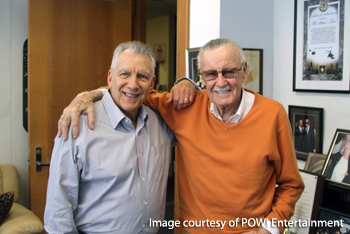 TJ: So what is an average day for you?
TJ: So what is an average day for you?
LEE: I wake up, come to the office, and get yelled at by my partner, Gill Champion. (laughs) We try to take the project that needs the most attention that day and discuss how we’ll do it. If it’s a story, what’s the best way to do the script? If it’s a film, who’s best to direct it? There are so many decisions that before you know it, the day is over.
 TJ: And the two of you created POW! Entertainment together?
TJ: And the two of you created POW! Entertainment together?
LEE: Yes. And a third partner who is not with us any longer, but we’ve been running it together for over ten years.
TJ: Do you have any regrets in your career?
LEE: Not really, I’m usually too busy... But yeah, I’d like to have created Superman. (laughs)
TJ: So was there a turning point in your career?
LEE: Yeah, when my wife said, “Make the stories that you want to write.” I guess that was as much of a turning point as you can get.
TJ: Do you have a proudest achievement?
LEE: Yeah, that you bothered to come and interview me. It makes me feel very important.
TJ: I bet! You must be very nervous.
LEE: (Laughs) I like what I’ve done. I like the fact that people seem to be interested in it.
TJ: Tell me what you would like to do in the future.
LEE: Exactly what we are doing now. We have so many movies and shows being prepared, I can’t wait until they’re on the screen, so there is always a lot to look forward to.
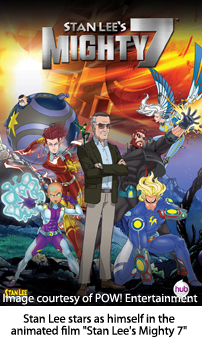 TJ: Can you give me an example of a current project?
TJ: Can you give me an example of a current project?
LEE: Yeah, we have one called Stan Lee’s Mighty 7: a new group of superheroes that I came up with. It’s going to appear on the Hub television network as an animated motion picture. In fact they are supposed to do three of them. I like to consider it the world’s first reality superhero story because I appear as a character, as do other living people. So it’s our usual type of superhero thing plus the inclusion of real people.
TJ: So you’ve made many cameos in various pictures, Do you want to have a more signif icant part?
LEE: (laughs). I wouldn’t have time to go to rehearsals even if they wanted me, and nobody has said they want me. I guess I have a starring role in the Mighty 7, but since it’s a cartoon, all I have to do is lend my voice. I have a supporting role in a television series based on Marvel characters, called “Shield”. I’m excited about that. But again, I could do that in one hour.
TJ: You seem very happy. What’s your secret?
LEE: Oh, that’s just an act I put on for interviews. (laughs) I don’t know. I think if you’re lucky enough to enjoy your work, the woman you come home to, and the people you work with, I don’t know how you can have more.
TJ: You’ve lectured all over the U.S. at various colleges and universities, right?
LEE: Oh, from maybe 1970 to 1980 there wasn’t a day that I wasn’t going to some school or university somewhere. You’re paid for one lecture but you’re really doing about four. Because when they pick you up at the airport, it’s usually a bunch of kids who won a contest or something, and they’re asking questions the entire ride. That’s one lecture! You make your lecture. That’s Number Two. Then the Dean or somebody says, “Before you go, the student committee would like to have dinner with you.” But every time you lift your fork, ya gotta stop and answer a question. That’s your third! Then another group drives you to the airport - that’s your fourth! The first lecture I did I was so excited and put on my best suit and made sure I looked real good. I got there and they were like a bunch of hippies - dirty slacks; torn, dirty t-shirt… I felt like an idiot! The next time I said, “I’m not going to make the same mistake again”, and I dressed like a slob. I went there and was invited to dinner at the Dean’s residence, all served by a guy with white gloves and I’m sitting there looking like a bum! So, one of the big problems of college lecturing is you never know what to wear!
TJ: Were your lectures standardized?
LEE: I had a prepared speech but tried not to say the same every time. I would ask whoever hired me, “What are they most interested in?” Of course usually it was superheroes. I learned that academics thought that reading comics was the greatest thing for young children, because it taught them to enjoy reading. If you put a 5- or 6-year old in front of the television, and there’s a superhero comic book laying there, at some point they’ll pick up that book, and you can’t enjoy it unless you can read. So they kind of forced themselves to learn to read. These books that people used to hate turned out to teach literacy, which made me very happy.
TJ: Did you, yourself, attend college?
LEE: Only for six months and only because there was a girl I liked. I signed up for a night course so I could be with her, but then we broke up so that was the end of my college career.
TJ: It seems that a lot of your superheroes are intelligent.
LEE: Yes. Spider-Man was a science honors student. Iron Man was a multimillionaire, inventor of weapons and things, but an intellectual. Bruce Banner, The Hulk, was a scientist. Now that I think about it most of my heroes were intellectuals!
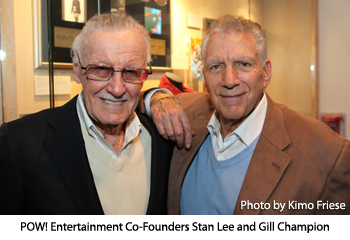 TJ: Let’s talk about the business side of POW! Entertainment.
TJ: Let’s talk about the business side of POW! Entertainment.
LEE: Then, let me introduce you to my partner, Gill Champion. The good thing about Gill is he knows what he’s talking about!
CHAMPION: Yes, Stan, but you could fool anybody! (laughter)
TJ: Mr. Champion, could you tell us a bit about yourself and POW! Entertainment?
CHAMPION: I’m President and CEO of POW! Entertainment. You explained what POW! stands for, didn’t you Stan? LEE: POW! is Purveyors of Wonder.
TJ: And how did POW! come about?
CHAMPION: Post Marvel - I was fortunate enough to meet Stan. Despite his personality, I fell in love with his vision for creating new franchises. We’ve been working every day and night since then.
TJ: And what business were you in before that?
CHAMPION: Entertainment - production, licensing and merchandising.
TJ: What are some of your biggest projects at the moment?
CHAMPION: Well, every project we do here is big! But we probably have 25 or 30 in various stages of development including live action and animation, film, television, digital... and we really see the future of distribution on new tablets and iOS operating systems that reach a whole new generation of fans for us.
TJ: What is your favorite part about working with Stan Lee?
CHAMPION: Everything. I’m really the luckiest guy I know.
LEE: I keep telling him that…
CHAMPION: You told me to say that! No, really… I can’t wait to come to work, which is a rarity, I am sure.
TJ: What are your secrets to time management?
CHAMPION: There is no time management. We just crush in everything we can, and now between the Internet and Skype conferencing, it’s really a 24-hour day.
TJ: Do you have any comments, Mr. Lee?
LEE: No, I was fascinated by what he said. I was wishing I could keep my answers as brief as he does. I tend to talk too much but he’s teaching me.
TJ: From a corporate perspective, what is the strength of POW! Entertainment?
CHAMPION: Our intellectual property is the key. The strength of POW! is its assets, and the assets are the IP. We really have a treasure chest of IP and most of it has been created by Mr. Lee. 10 or 15% of projects brought to us fit under the Stan Lee / POW! umbrella and so we embrace those.
TJ: Great. Well, we’ve got 8 minutes. I can’t believe it. Mr. Lee, just keep talking!
LEE: I’m not used to not talking! I didn’t realize he’d take over the way he did. I wouldn’t have invited him in! (laughs)
TJ: Well, let’s get back to it. Any dreams still to achieve?
LEE: Oh, yeah. I haven’t won an Oscar. Or an Emmy. Or a Nobel Prize. Or a Pulitzer. There is a lot still to be done!
TJ: What awards have you received?
LEE: Oh, actually quite a few: all sorts of little metal things and plaques. I’ve gotten the key to a number of cities that I’ve spoken at. But I’m always disappointed because the key doesn’t unlock anything. It’s just a heavy thing that I have to carry back…it’s nice to get it.
CHAMPION: His home looks like a museum and a treasure chest of all this memorabilia that has been collected.
TJ: I bet. Well, the pictures here in your off ice. It looks like you’ve met a few people! President Reagan, Bush, Hillary Clinton…
LEE: I’ve got to tell them, “Guys - run the country by yourself! I’m busy! I’ll try to help ya but don’t be a pest.” (chuckles)
CHAMPION: There’s one thing we’d like to see. There has been a movement in the Academy Award divisions to create an award for Best Cameo Actor. Stan’s a shoe-in.
TJ: Mr. Lee, is there anyone that you were nervous to meet?
LEE: Not really. It’s fun meeting people. Even when I met President Bush, Gil was with me. I got an award – and that was a very funny thing. Olivia de Havilland also got one and he kissed her on the cheek. So I said to him, “I’m not going to have to kiss you, am I?” And he started laughing… I’ll never forget that. Luckily he had a sense of humor.
TJ: Do politics play a big role in cartoons?
LEE: Not really. I was always aware that I had a lot of influence among readers so I never wanted to give my feeling about Republicans, Democrats, liberals, conservatives… that wasn’t my place. I always tried to stay away from anything to do with influencing kids as far as politics go. I tried to influence them as far as doing the right thing, but not politics.
TJ: Do you have a message to young people that are just starting their careers?
LEE: Yeah, come see all my movies and cameos, and buy all my comic books! Anytime POW! does something, be sure you don’t miss it! (laughs) No, the only thing I would say is a lot of people try to write for somebody else. I have never felt that way. I try to write stories that I would wanna read. Because I don’t know you that well. But I know myself. If I can write a story and I can’t wait to see how it ends, hopefully there are other people with the same taste. Don’t start out saying, “Oh, I think that would interest that type of person so I’ll write that.” You know yourself better than you know that person…..That was very profound! (laughs) tj
The original article can be found in Issue #274 of the Tokyo Journal. Click here to order from Amazon.
